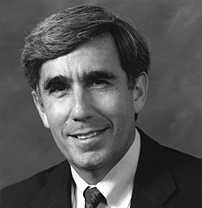Four Cold Warriors'
plea
for a nuclear-free world

By
David
Krieger
January 6, 2007
An amazing and important commentary appeared
in the January 4, 2007 issue of the Wall Street Journal, co-authored by
four high-level architects of the Cold War: George Shultz, William Perry,
Henry Kissinger and Sam Nunn. The article, entitled “A World Free
of Nuclear Weapons,” was amazing not so much for what it proposed,
but for who was making the proposal.
The four prominent former US officials reviewed
current nuclear dangers and called for US leadership to achieve the abolition
of nuclear weapons. Their argument was as follows:
1. Reliance on nuclear weapons for deterrence is becoming increasingly
hazardous and decreasingly effective.
2. Terrorist groups are outside the bounds of deterrence strategy.
3. We are entering a new nuclear era that will be more precarious, disorienting
and costly than was Cold War deterrence.
4. New nuclear weapons states lack the safeguarding and control experiences
learned by the US and USSR during the Cold War.
5. The nuclear Non-Proliferation Treaty envisioned the elimination of
all nuclear weapons.
6. Non-nuclear weapons states have grown increasingly skeptical of the
sincerity of the nuclear weapons states to fulfill their Non-Proliferation
Treaty obligations to eliminate their nuclear arsenals.
7. There exists an historic opportunity to eliminate nuclear weapons in
the world.
8. To realize this opportunity, bold vision and action are needed.
9. The US must take the lead and must convince the leaders of the other
nuclear weapons states to turn the goal of nuclear weapons abolition into
a joint effort.
10. A number of steps need to be taken to lay the groundwork for
a world free of nuclear threat, including de-alerting nuclear arsenals;
reducing the size of nuclear arsenals; eliminating tactical nuclear weapons;
achieving Senate ratification of the Comprehensive Test Ban Treaty and
encouraging other key states to also do so; securing nuclear weapons and
weapons-usable materials everywhere in the world; and halting production
of fissile materials for weapons, ceasing to use enriched uranium in civil
commerce and removing weapons-usable uranium from research reactors.
For many of us committed to the global effort to abolish nuclear weapons,
there is nothing new in their arguments. They are arguments that many
civil society groups have been making since the end of the Cold War. Other
former officials, such as Robert McNamara and General George Lee Butler,
former head of the US Strategic Command, have also made such arguments.
What is new is that these former Cold Warriors
have joined together in a bipartisan spirit to publicly make these arguments
to the American people. This means that the perspectives of the Nuclear
Age Peace Foundation, the Global Security Institute, the Nuclear Policy
Research Institute and other dedicated civil society groups are finally
being embraced by key former officials who once presided over Cold War
nuclear strategy.
The bipartisan advice of Shultz, Perry, Kissinger and Nunn to abolish
nuclear weapons will require a full reversal of the current Bush administration
nuclear policies. The Bush administration has thumbed its nose at the
other parties to the nuclear Non-Proliferation Treaty, behaving as though
the US had no obligations to fulfill its commitments for nuclear disarmament
under the treaty. The administration has largely opposed the 13 Practical
Steps for Nuclear Disarmament agreed to by consensus at the 2000 Non-Proliferation
Treaty Review Conference.
If the administration wants to demonstrate leadership toward nuclear weapons
abolition, it could immediately submit the Comprehensive Test Ban Treaty
to the Senate for ratification; call for negotiations at the Conference
on Disarmament of a Fissile Material Cut-off Treaty; reach an agreement
with Russia to begin implementing deeper cuts in the nuclear arsenals
of the two countries, which Russia supports; and call for a summit of
leaders of all nuclear weapons states to negotiate a new treaty for the
elimination of nuclear weapons.
If the United States becomes serious about leading the way to a world
free of nuclear weapons, as called for by the former US officials,
it can assume a high moral and legal ground, while improving its own
security and global security. Each day that goes by without US leadership
for achieving a nuclear weapons-free world undermines the prospects
for the future of humanity.
There is no issue on which US leadership
is more needed, and there is no issue on which the US has more to
gain by asserting such leadership.
The 19th century philosopher Arthur Schopenhauer
said, “All truth passes through three stages. First, it is ridiculed.
Second, it is violently opposed. Third, it is accepted as being self-evident.”
The truth that if we are to have a human future the US must lead the way
in abolishing nuclear weapons has been frequently ridiculed and violently
opposed. The commentary by Shultz, Perry, Kissinger and Nunn suggests
that this truth may now be entering the stage of being self-evident.
Copyright
© TFF & the author 1997 till today. All rights reserved.
Tell a friend about this TFF
article
Send to:
From:
Message and your name
Get
free TFF articles & updates
|